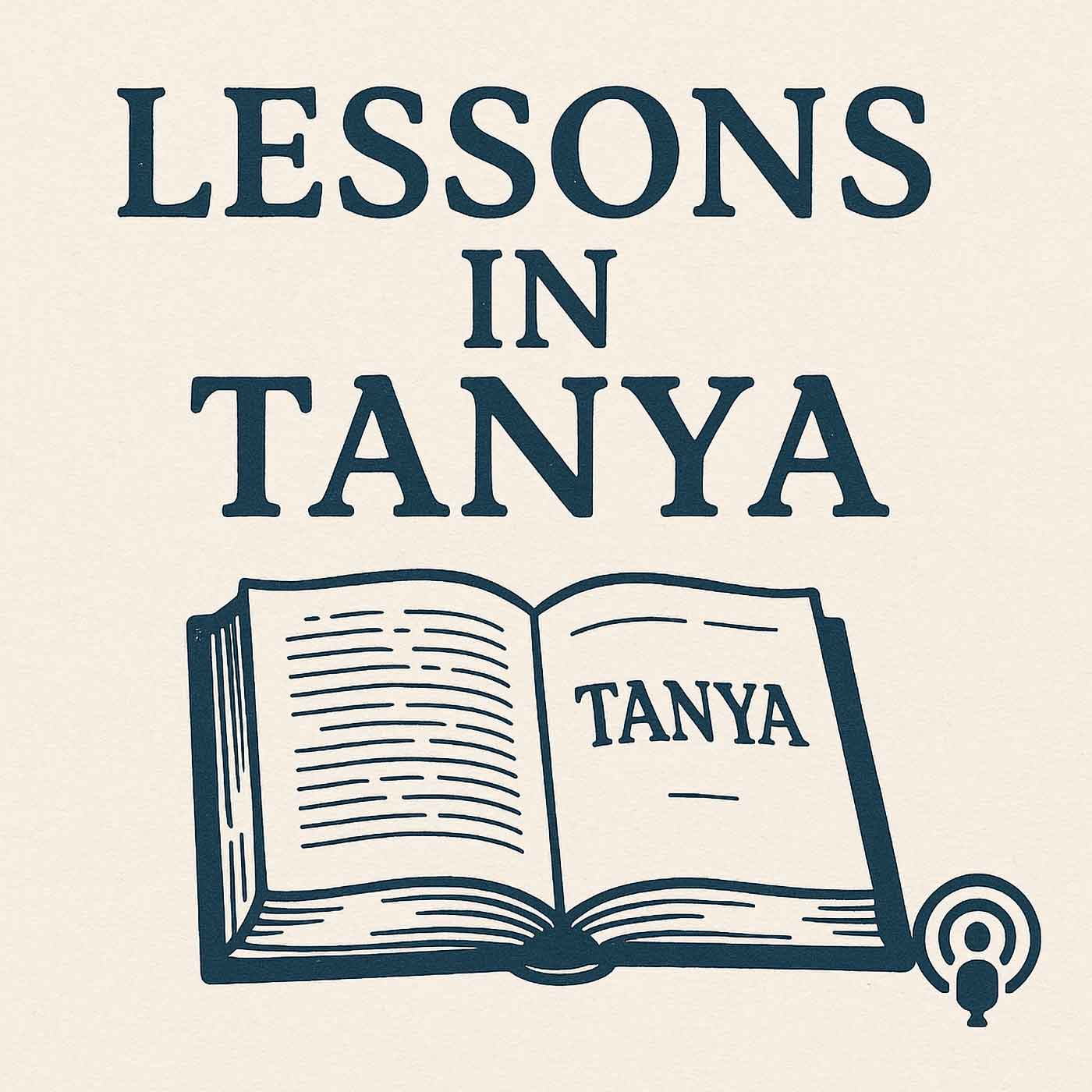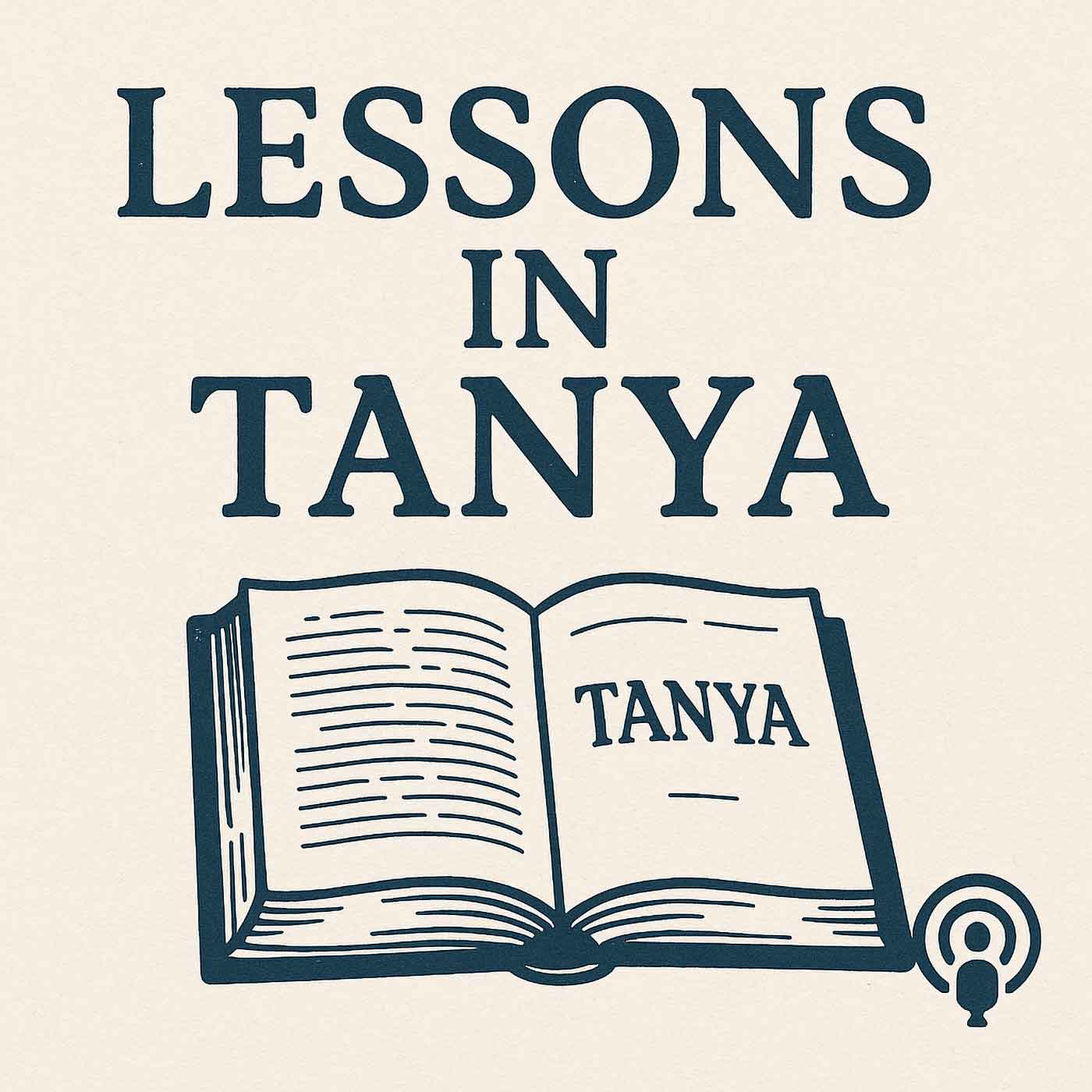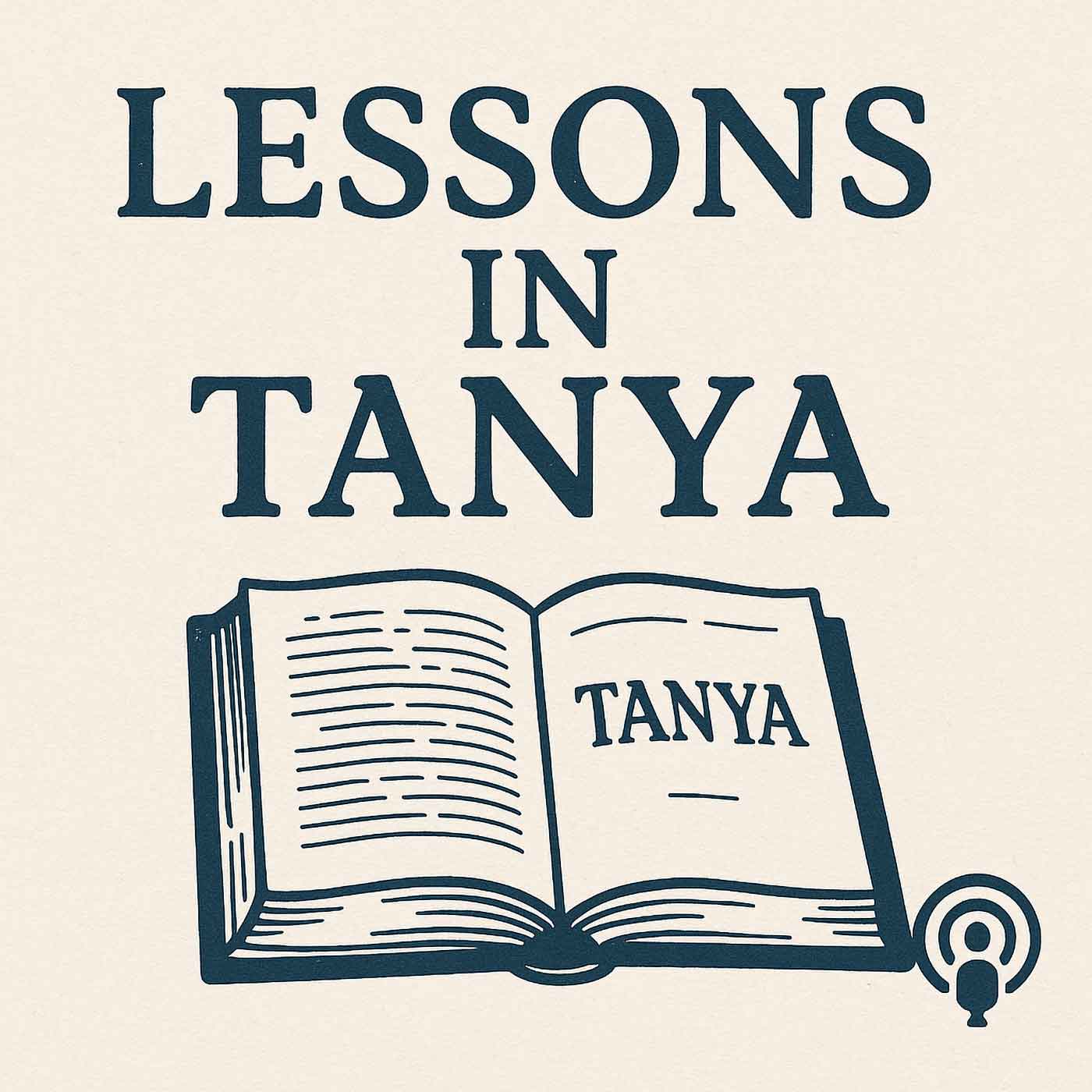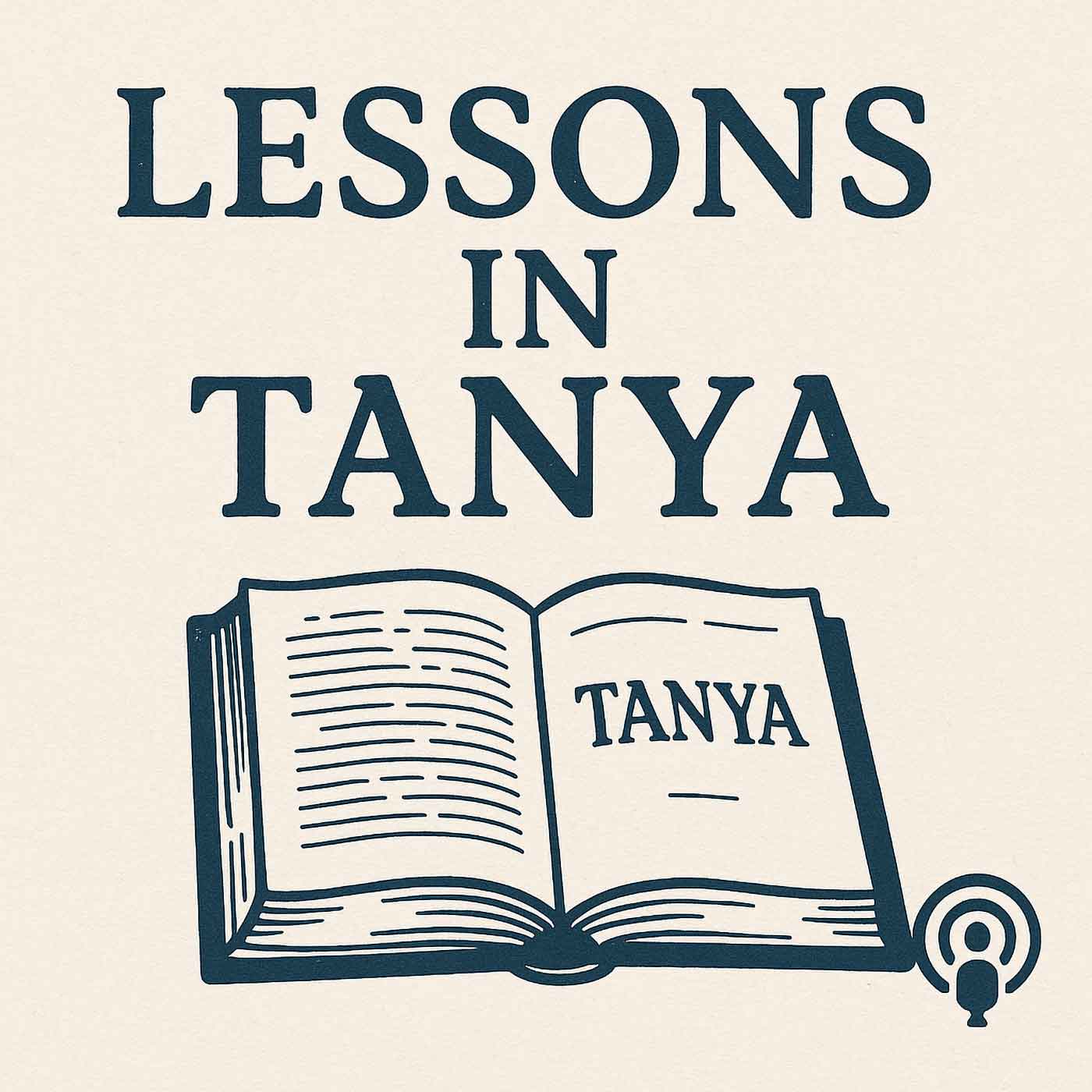Episode Transcript
[00:00:00] Speaker A: Welcome to Lessons in Tanya, chapter 13.
We're back picking up right where we left off in our deep dive into the spiritual landscape described in this foundational text.
Specifically, that really intriguing profile of the intermediate person.
[00:00:14] Speaker B: Right.
[00:00:15] Speaker A: In our last deep dive, we sort of cleared up one of the biggest misconceptions, didn't we?
[00:00:19] Speaker B: The idea that they're half good, half bad in their actions.
[00:00:22] Speaker A: Exactly. The text makes it really clear. The intermediate person, well, their undesirable urges, their thoughts, they do arise, sometimes quite powerfully.
[00:00:32] Speaker B: Yeah, the struggle is real.
[00:00:33] Speaker A: But their spiritual core, that inner drive for good, it just always prevails. It stops those urges from becoming harmful actions or speech or even, you know, negative thoughts they actually dwell on.
[00:00:45] Speaker B: Their whole outward life is about virtuous living, following divine guidance. That's the baseline we set. Okay, now this chapter takes that definition and immediately throws, well, what seems like a paradox at us.
[00:00:56] Speaker A: Right.
[00:00:57] Speaker B: It describes the same person, the one who never sins an action, as being judged by both their good and evil inclinations.
[00:01:04] Speaker A: Which sounds odd if they always do good.
[00:01:06] Speaker B: Exactly. So our mission today is to really get inside what that phrase means within the text's framework. It's. It's pretty key to understanding their internal reality.
[00:01:18] Speaker A: Okay.
[00:01:19] Speaker B: We'll look at the surprising implications of this state and dive into this. Well, this profound idea about how even temporary moments, moments of high spiritual connection, can be seen as true on their level.
[00:01:31] Speaker A: Yeah, it definitely challenges some common ideas about what it means to be good or bad or, you know, somewhere in the middle.
[00:01:37] Speaker B: It really does.
[00:01:38] Speaker A: For anyone out there who feels that internal tug of war, I think this chapter offers a totally different way to look at it. So let's jump into this judged by both idea. Okay, so as we said, if you hear intermediate and you picture someone, like, with a mixed scorecard of good and bad actions, then judged by both might just sound like tallying up the points. But if they're really alternating, sometimes good.
[00:02:02] Speaker B: Sometimes bad, then maybe ruled by both would fit better.
[00:02:05] Speaker A: Exactly. Sometimes a good side rules, sometimes the bad. But that's not what the text says.
[00:02:09] Speaker B: No. And that common sense interpretation is precisely what the text is trying to, well, dismantle.
Because as we defined it, the intermediate person never actually lets the evil inclination rule their body or mind in that way. No sinful actions, speech, or thoughts. Okay, so judged by both isn't about a scorecard. It's describing the constant internal process.
[00:02:33] Speaker A: Ah, okay. And the text uses a metaphor for this, right? A kind of legal metaphor.
[00:02:37] Speaker B: It does, yeah. Courtroom inside the evil inclination and the spiritual drive for good are like two internal judges.
[00:02:45] Speaker A: Two judges. How does that work?
[00:02:46] Speaker B: Well, the evil inclination, which is primarily seated in the left part of the heart, it acts like one judge. It presents its opinion.
[00:02:53] Speaker A: Its case, so to speak.
[00:02:54] Speaker B: Exactly. It states its argument, stirs up a desire for something worldly, something against divine will, and basically demands the person act on it. It's like giving its verdict on what you should do from its perspective.
[00:03:05] Speaker A: That's just one opinion. It's not the final word.
[00:03:08] Speaker B: Absolutely not. That's where the other judge steps in. The spiritual drive for good. It's rooted in the brain, extends down to the right part of the heart. Okay, so as soon as that negative urge arises from the left side, bang. The spiritual drive immediately challenges it. It presents its counter opinion.
[00:03:25] Speaker A: And this is the constant battle we talked about.
[00:03:27] Speaker B: This is it. The spiritual drive actively fights to make sure those, you know, passionate self serving desires from the evil side never turn into actual sinful actions or speech or even thoughts you accept and dwell on.
[00:03:42] Speaker A: Its opinion is always for virtue.
[00:03:44] Speaker B: Right. Its verdict is that the entire person, body and mind, must only be used for good, for divine service.
[00:03:51] Speaker A: Okay, so you've got the evil side saying, do this selfish thing and the good side countering, no, do this virtuous thing. Who makes the final ruling? Who's the ultimate decider here?
[00:04:00] Speaker B: And here's where the text gives us this really crucial, maybe surprising insight.
[00:04:05] Speaker A: Okay.
[00:04:05] Speaker B: The final verdict, the actual ability for the good side to consistently win. It doesn't just come down to the person's own willpower, really?
[00:04:12] Speaker A: Not just grit and determination?
[00:04:14] Speaker B: Not solely, no. The text is very clear.
The ultimate arbitrator, the one who ensures the good prevails, is the Almighty.
[00:04:22] Speaker A: Wow. So divine intervention is part of the intermediate person's makeup? In a way.
[00:04:27] Speaker B: According to this text, yes. It actually quotes ancient wisdom saying if the Almighty did not help him, he could not overcome the evil inclination.
[00:04:37] Speaker A: So the evil side is that strong?
[00:04:39] Speaker B: Its nature is powerful. Without that divine assistance the text implies, the human spiritual drive just wouldn't be strong enough to maintain constant victory day after day.
[00:04:50] Speaker A: That really changes the perspective. It's not just my fight, it's a partnership.
[00:04:53] Speaker B: It reframes it entirely. The text describes this help as a kind of glow of divine light.
[00:04:59] Speaker A: A light?
[00:04:59] Speaker B: Yeah, that illuminates the spiritual drive. This light gives the good side the. The superiority, the mastery it needs to overcome what the text calls the folly and darkness of the evil side.
[00:05:09] Speaker A: Like turning on a light in a dark room.
[00:05:11] Speaker B: Exactly. That analogy. The Light just banishes the darkness. It highlights that while you have to fight, the capacity to win consistently comes from beyond your own inherent strength.
[00:05:19] Speaker A: Okay, so let's circle back then. The intermediate person is judged by both because both sides are always active, always stating their case, always vying for influence. But they are not ruled by both.
Because the good side, with that divine help, always stops the evil from actually taking control of what the person does, says or thinks.
[00:05:41] Speaker B: Precisely. That's the core distinction.
[00:05:43] Speaker A: And if the evil did manage to rule, say just for a moment over the person's body, the small city as the text calls it.
[00:05:51] Speaker B: The text is pretty stark about that. If the evil nature gains any kind of control, any dominion, even for a second, yeah, at that very moment the person is considered wicked.
[00:06:01] Speaker A: So it's a knife edge thing. The intermediate's evil side might be loud, making demands like a judge, right, Laying.
[00:06:06] Speaker B: Out its arguments, but it never actually.
[00:06:08] Speaker A: Gets to bang the gavel and dictate behavior.
[00:06:10] Speaker B: Right?
[00:06:11] Speaker A: The spiritual drive, divinely supported, always prevents that final reeling from happening.
[00:06:15] Speaker B: That's it.
[00:06:16] Speaker A: Okay, this leads to another fascinating point, which again feels like a bit of a contradiction.
[00:06:20] Speaker B: Ah yes, the self perception issue.
[00:06:24] Speaker A: Right? There's guidance saying you should view yourself as being essentially in the state of a wicked person.
But then other wisdom says, don't be wicked in your own estimation. Because thinking of yourself that way can lead to sadness. It can undermine the joy you need for spiritual practice. How does the text square that circle?
[00:06:43] Speaker B: It's a very subtle point and the text is careful here. The instruction isn't to think you are actually wicked, it's to be like a wicked person in one specific way.
[00:06:52] Speaker A: Okay, like a wicked person. But how? This person never sins. What does that mean?
[00:06:58] Speaker B: It means according to the text, always remembering, always acknowledging that the evil inclination inside you in the left part of your heart, it still has its full natural strength.
[00:07:07] Speaker A: Its original power.
[00:07:08] Speaker B: Exactly. It still possesses that intense inherent desire for worldly things, for non virtuous pursuits. Just like it does in someone who is actually wicked and acts on those desires. Its core nature, its drive, hasn't been weakened or removed. It's still there.
[00:07:23] Speaker A: But hang on again.
The intermediate person doesn't act on this, so how can its strength still be full?
It seems like it has been weakened. If it can't cause sin.
[00:07:33] Speaker B: Ah, but why can't it cause sin? That's the key insight tying back to the divine help. Okay, the evil inclination doesn't have the power to spread through the body and make you sin. Not because you've personally diminished its core strength through your struggle, but only because of the Almighty's constant help, that divine light illuminating your good side. The evil's potential, based on its raw nature, is still fully there. It's just that divine intervention prevents that potential from actually manifesting in your behavior.
[00:08:02] Speaker A: Ah, okay. So it's like having a really powerful wild animal.
[00:08:05] Speaker B: Yeah.
[00:08:06] Speaker A: Maybe it's caged or held back by a stronger force. The animal itself hasn't lost its wildness or strength.
It's just contained.
[00:08:14] Speaker B: Precisely. And the text explains why it's dangerous not to see yourself this way.
[00:08:18] Speaker A: How so?
[00:08:19] Speaker B: If you mistakenly believe, oh, the evil inside me is gone, it's nullified, which is actually the level of a perfectly.
[00:08:25] Speaker A: Righteous person, where the evil truly is gone.
[00:08:27] Speaker B: Right. If you think you're there, but you're actually intermediate, you might get complacent. You might stop actively fighting that internal battle.
[00:08:35] Speaker A: And if you stop fighting, you become vulnerable.
[00:08:37] Speaker B: You could have a major spiritual setback because the potential for evil is still there, even if dormant for a while.
[00:08:43] Speaker A: I see the danger. And, you know, the text even notes that other people might look at the intermediate person's actions, always good, always virtuous, and assume they are perfectly righteous.
[00:08:54] Speaker B: Exactly. People see the outward behavior and think the internal struggle must be over. The text specifically warns against buying into that external view.
[00:09:03] Speaker A: You have to know your own internal reality.
[00:09:05] Speaker B: You have to maintain that internal awareness that the core essence, the potential strength of that evil inclination is still present, still significant.
The source even suggests that through just, you know, everyday living, eating, drinking, engaging with the world through the animal soul, that evil inclination might even get stronger over time.
[00:09:25] Speaker A: Wow. So not acting on it doesn't necessarily.
[00:09:27] Speaker B: Weaken its root, not its inherent nature. No, that just underscores why you can't assume it's gone.
Okay, so then the text brings up an interesting case study. Almost.
Someone whose whole life is devoted to virtuous study, spiritual practice day and night.
[00:09:42] Speaker A: You'D think, surely for that person, the evil inclination must be gone, Right? Eliminated.
[00:09:47] Speaker B: That's the logical assumption. But the text says, not necessarily the essence of it.
[00:09:52] Speaker A: How can that be? Their actions are completely pure.
[00:09:55] Speaker B: It goes back to the mind, body connection. The text explains that the Almighty gave the mind the ability to direct the heart and the body. Okay, so the spiritual drive, which is mainly seated in the mind, can effectively rule the body's organs. It can use your body, your speech, your thoughts, as like garments or vehicles for performing divine instructions and virtuous acts.
[00:10:16] Speaker A: So it controls the outer expression completely.
[00:10:18] Speaker B: In that practical sense, controlling behavior, the spiritual drive is totally in charge. The animal soul, where the evil inclination lives, is made subservient in that domain, the domain of action.
[00:10:30] Speaker A: Okay, so the mind controls the body's actions.
But are you saying that doesn't mean the spiritual drive controls the very essence of the animal soul itself deep down?
[00:10:40] Speaker B: Exactly. Not fully, not permanently in an intermediate person, except at specific moments.
[00:10:48] Speaker A: Ah, okay. What kind of moments? When does the good side get deeper?
[00:10:51] Speaker B: Control moments when a really intense love for the divine is strongly felt when right in the heart. The text uses focused prayer as the prime example.
[00:11:00] Speaker A: During prayer, okay.
[00:11:01] Speaker B: At those times, times of heightened spiritual feeling, the spiritual drive does gain a more profound upper hand. It affects the very essence of the animal soul and the evil inclination within it more deeply.
[00:11:13] Speaker A: So like a temporary surge of power for the good side?
[00:11:15] Speaker B: Something like that. The text uses an analogy from ancient scripture about a battle between two forces, saying one nation shall prevail over the other. This gets applied spiritually.
The good side prevails over the evil side. It dominates. It wins the battle in that moment. But crucially, it doesn't necessarily completely destroy or nullify the evil permanently.
Ancient commentary quoted even says when this one rises, that one falls, suggesting it's dynamic. The evil can be pushed down, but it might rise again later.
[00:11:46] Speaker A: Ah, I get it. So during that intense prayer or spiritual feeling, the evil is suppressed or maybe dormant, like someone sleeping who could wake up.
[00:11:56] Speaker B: Exactly. The word the text uses dormant, like a sleeping person.
[00:11:59] Speaker A: But it hasn't been, you know, annihilated. Removed from its place in the heart.
[00:12:04] Speaker B: Precisely. The text is very clear. In the intermediate person, even at these peak times, the evil is just dormant. It is not nullified, that nullification, where the place in the heart for evil desire is described as completely void. That's the unique state of the perfectly righteous place person.
[00:12:19] Speaker A: Okay, so even these incredible peak moments of love and connection, they're temporary victories over the evil's activity's immediate influence, but not a total wipeout of its potential or its basic nature within the person.
[00:12:30] Speaker B: That seems to be the picture painted here.
[00:12:32] Speaker A: Right. This leads us to the final point and maybe the most philosophically tricky part of this chapter.
The source mentions this great sage from the past, Rabba.
He considered himself an intermediate person, Right?
[00:12:48] Speaker B: Which is startling.
[00:12:50] Speaker A: It is because he was known for studying constantly. And apparently he experienced this perpetual intense yearning for the divine, like the feeling most people only get during deep prayer. But he felt it all the time, non stop connection. So how could someone at that Level, that incredibly elevated state still classify himself as intermediate based on the definition we've been talking about?
[00:13:12] Speaker B: Yeah, this example really pushes the boundaries, but it helps illustrate a very high level within the intermediate category.
Rabba, as the text describes him, was basically an intermediate person living constantly in that state of intense love driven connection, the state that's usually just temporary for most intermediate people doing prayer.
[00:13:30] Speaker A: He lived at the peak, essentially.
[00:13:32] Speaker B: Right. The text says it was as if he prays all day long. Now, because his evil inclination was always kept dormant by this continuous powerful love.
[00:13:41] Speaker A: He wouldn't have felt those overt negative desires popping up all the time.
[00:13:45] Speaker B: Exactly. He likely lacked the obvious surface level negative desires that a more typical intermediate person is constantly batting away.
So outwardly and even in his own conscious experience, it might have seemed very much like the state of a perfectly righteous person.
[00:14:01] Speaker A: Okay, so why wasn't he perfectly righteous then?
[00:14:04] Speaker B: Because that state, the evil being dormant, was maintained by the constant activity of his intense love. It wasn't because the evil's core essence had been inherently nullified or removed from his heart.
[00:14:15] Speaker A: Ah, the potential was still there. Even if inactive, the potential for it.
[00:14:19] Speaker B: To reawaken still existed. Deep down. That's the crucial difference from the perfectly righteous. Where that potential is gone, the space is void.
[00:14:27] Speaker A: So with incredible spiritual honesty and understanding of these levels, and humility. And humility, he could accurately see himself as intermediate, just operating at the very, very highest end of that spectrum.
[00:14:38] Speaker B: An extraordinary case, but it fits the.
[00:14:40] Speaker A: Definition that clarifies Rabba's situation, but raises another question. The text says that the intermediate person's intense love during prayer, even if it is temporary, for most, it's still considered true service.
But that feels off because the source itself quotes this.
The language of truth shall be established forever. Truth sounds permanent. How can a temporary feeling be true service?
[00:15:07] Speaker B: This is where the text gets really deep, introducing a profound concept about the nature of truth itself, especially in the spiritual context.
[00:15:15] Speaker A: Okay.
[00:15:15] Speaker B: The explanation given is that truth isn't just one single absolute standard that applies everywhere to every level of reality. Instead, truth exists on every level.
[00:15:24] Speaker A: Truth is relative to the level. That sounds unusual.
[00:15:27] Speaker B: It can feel counterintuitive to how we usually think of truth. Yes, but the text explains it means aligning with the essence, the core potential of that specific level you're on.
[00:15:37] Speaker A: So something is true on its level if it authentically expresses the highest possibility for that level?
[00:15:44] Speaker B: Exactly. It doesn't need to meet the standard of a higher level to be considered true and valid on its own level.
[00:15:51] Speaker A: Can you Give an analogy.
[00:15:53] Speaker B: The text uses a powerful one. It calls truth like a middle bolt, which secures everything from end to end, referring to a part of the ancient tabernacle structure.
[00:16:02] Speaker A: Okay.
[00:16:03] Speaker B: Spiritually, this bolt of truth passes through the central point point, the core reality of each level in the spiritual hierarchy, establishing the unique standard of truth for that specific level.
[00:16:15] Speaker A: So the benchmark for what counts as true success or authentic service changes depending on where you are spiritually.
[00:16:21] Speaker B: Precisely. And the text reinforces this by mentioning that lower levels are fundamentally incomparable to higher ones. Even the very best part of a lower level is still intrinsically below even the lowest part of the level above it.
[00:16:34] Speaker A: They're just different categories of reality.
[00:16:36] Speaker B: Right. This huge difference highlights that each level operates by its own distinct measure of authenticity and achievement.
[00:16:43] Speaker A: So applying that back to the intermediate.
[00:16:44] Speaker B: Person, their intense love during prayer, their dedicated service, while it's not true when you compare it to the constant, unwavering state of a perfectly righteous person whose evil is totally gone, it is considered true service relative to the standards and potential of their level. The intermediate level.
[00:17:04] Speaker A: Why?
Because that's the best they can achieve consistently.
[00:17:08] Speaker B: It's more that their spiritual drive inherently has the power to keep reawakening this love day after day, through their own effort and preparation. The potential for this elevated state is always there for them, always accessible.
[00:17:22] Speaker A: Ah, so the potential to reach that state again makes the state itself true for them.
[00:17:27] Speaker B: It makes their striving and those moments of connection they achieve authentic and true relative to their own spiritual reality and capability.
And that inherent capacity for reawakening validates their service as true on their level.
[00:17:41] Speaker A: Wow. Okay. That really does flip the perspective. It means the intermediate person's constant struggle, even the temporary nature of their highest spiritual feelings isn't a sign of failure compared to a higher level. It's actually considered true because it represents them living out the full, authentic reality and potential of their specific spiritual station.
Even if that station involves a lifelong battle with an evil inclination that still holds its ground.
[00:18:07] Speaker B: Exactly. It's a validation of the process, the striving itself, recognizing its truth within its own context.
[00:18:14] Speaker A: This has been, well, a genuinely deep guise. Some really complex but fascinating concepts we've tried to untangle. How the intermediate person is judged by both, but never ruled by evil.
[00:18:26] Speaker B: That crucial divine help.
[00:18:28] Speaker A: Yes, the absolutely essential role of divine help. That challenging idea of seeing yourself like a wicked person even while doing good. And this really remarkable idea that spiritual truth isn't absolute, but relative to where you stand.
[00:18:41] Speaker B: Indeed. And perhaps a final thought for you, the listener, to maybe take away from all this. Consider this idea of relative truth. Where else in your own life, or maybe in how you understand different kinds of success or progress, might something be genuinely true or valid relative to its specific context? You know, its starting point, its inherent potential, even if it doesn't quite measure up to some high, higher, maybe more absolute standard you hold? What does acknowledging these different levels of truth tell us about how we value the journey, the effort involved, and not just the absolute, highest possible outcome?
[00:19:17] Speaker A: That is a powerful question to sit with. A lot to reflect on there. Thank you for joining us for this deep dive. We really hope it gave you plenty to think about.



